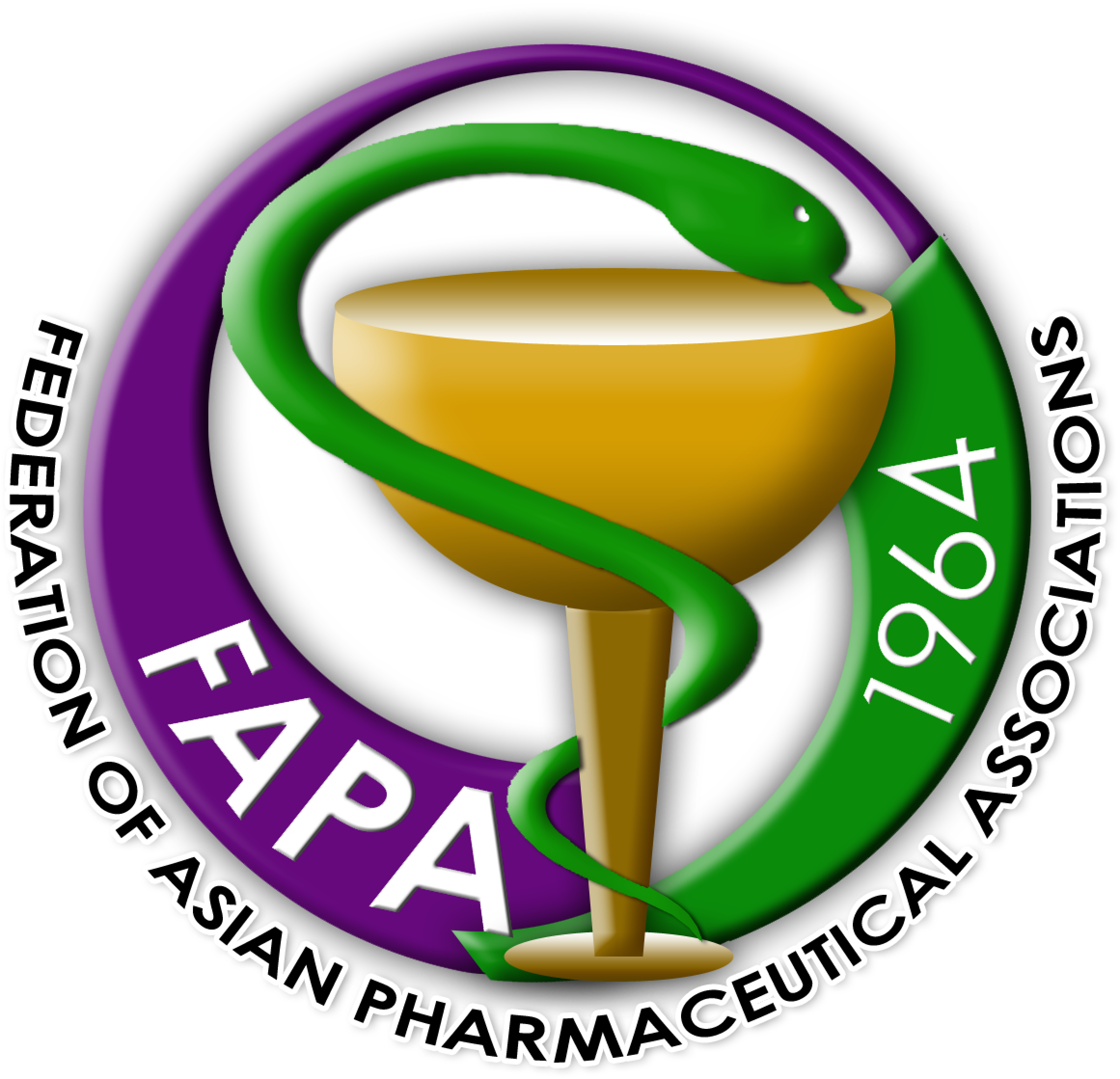Introducing the New FAPA Sections
In 2018, the FAPA council approved the restructuring of the FAPA sections upon the recommendation of the 14th FAPA Bureau with the aim of gathering more experts working in a similar area of interest and encouraging more pharmacists to submit poster and oral presentations in the FAPA Congress. The seven (7) FAPA Sections reflect the current practice areas of Asian pharmacists attending the FAPA congress and the areas of expertise that are relevant to the growing needs of each country.
1. Scientific Section
This section focuses on advances in the pharmaceutical sciences that contribute to the discovery, development, manufacture and use of safe, effective and quality medicines and medical products. The topics of interest under this section include but is not limited to the following: drug design and technology, formulation design and pharmaceutical technology, natural product research, biotechnology, pharmaceutical quality and analytical sciences, regulatory sciences, pharmacology, and precision medicine.
2. Pharmacy Education Section
This section provides a venue for pharmacy educators and training professionals to share their ideas, philosophies and experience in improving teaching and learning strategies, curriculum development, creative projects, tools and innovations in order to enable future pharmacists and pharmacy workforce to meet the changing needs of the different areas of practice.
3. Community Pharmacy Section
This section promotes the improvement of standards in community pharmacy practice by exchanging information relevant to technical and professional activities, community-based interventions, pharmacy-based interventions, as well as systems approaches and process innovations.
4. Hospital and Clinical Pharmacy Section
This section encourages presentations related to the provision of pharmaceutical care in hospital and clinical settings. Experiences, issues and model approaches in ensuring the safe and effective use of medicines in the hospital may include but is not limited to supply chain management, medication therapy management, patient safety, interprofessional collaboration and researches in various clinical and hospital practice specialties.
5. Industrial Pharmacy and Marketing Section
This section invites industrial pharmacists to build their network and share their expertise and experiences working on areas such as pharmaceutical manufacturing, product and process development, novel approaches, quality control and quality assurance, regulation and market research. Current and emerging issues, market trends and regulations that may impact pharmaceutical manufacturing and marketing.
6. Social and Administrative Pharmacy Section
This section promotes the exchange of ideas between pharmacists working as researchers, technical consultants, leaders, managers, or administrators in various settings such as professional societies, health maintenance organizations, government departments, health financing institutions, non-governmental organizations, and foundations. The main focus is to develop evidence-based policies and decisions, practice models and systems improvement, regulation and ethical guidelines and advocacies that impact the practice of pharmacy, health care, and public health.
7. Medicines and Health Information Section
This section encourages exchange of ideas between individuals working in organizations, institutions or specific roles that manage medicines and health information or provide information services. Particular focus is given to issues, developments and opportunities that affect healthcare communication, information systems and technology, health education and literacy, access to quality and reliable information resources and material, and other initiatives to empower both patients and professionals with information.
Section Chairpersons (2022-2026)
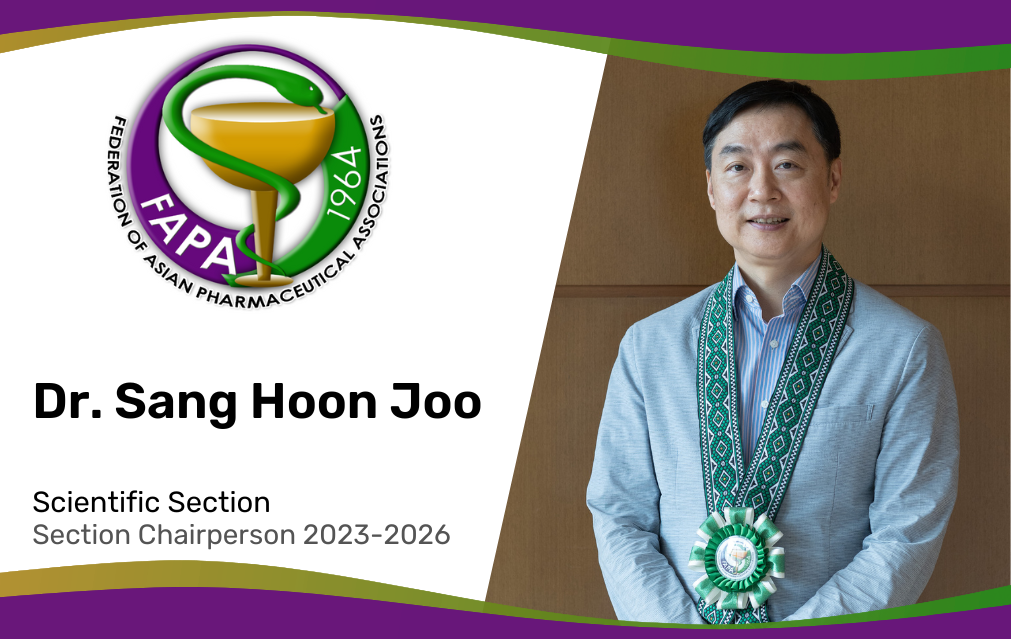
Scientific Section Chairperson
Dr. Sang-Hoon Joo
Member Association: Korean Pharmaceutical Association
Country: South Korea
As a pharmacist and educator teaching student pharmacy students, and as a scientist studying molecule discovery, drug action mechanism, and pharmaceutical sciences, He have been serving in Korean Pharmaceutical Association, his mother organization as a member of international affairs. His experience as an executive board member of the Western Pacific Pharmaceutical Federation allowed him to participate in international cooperation, and his academic background would enrich FAPA to expand it’s scientific section. Asia is characterized with diversity in pharmacy practice, languages, and cutting edge sciences driven by several countries including China, Japan, Korea, India, and others will be integrated by FAPA for the development in pharmaceutical professionalism in Asia.
As a scientific section chair, he would be greatly involved with the conference organization providing the visions with nano medicine, biologics, targeted personalized therapies, from bench to the clinical uses.
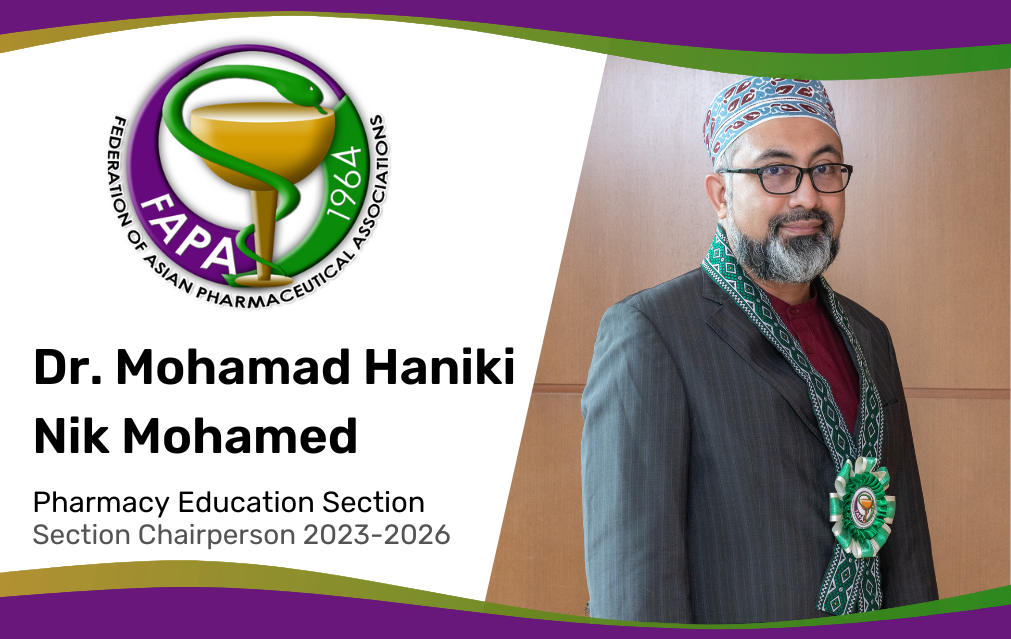
Pharmacy Education Section Chairperson
Dr. Mohamad Haniki Nik Mohamed
Member Association: Malaysian Pharmacists Society
Country: Malaysia
Prof. Dr. Mohamad Haniki is the current Pharmaceutical Education Section Chairperson of FAPA. As such, he plans for intra and inter-regional collaborations, knowledge sharing, capacity building, research and education transformations through networking and partnerships that will help shape the future of pharmacy education, science and practice. Responding to immediate challenges posed by the Covid-19 pandemic on pharmacy education, Prof. Haniki seized the opportunity to organize a webinar entitled “Pharmacy Education During and Beyond Covid-19: Changes, Challenges and Experiences in Asia Pacific” on May 15th 2020. Prof. Haniki moderated the webinar with speakers from 6 FAPA countries. The webinar was attended by more than 1,000 participants worldwide. Following this webinar, Prof. Haniki mooted the idea for publication of the experience and challenges as well as analysis of the questions received before and during the webinar. He successfully led the team as the corresponding author until publication of the paper in Pharmacy Education (2020), 20(2), 183 – 195 https://doi.org/10.46542/pe.2020.202.183195.
To further share and advance innovation in pharmacy education, Prof. Haniki organized another webinar under FAPA Education Section on Virtual Inter-Professional Education (IPE) and Collaborative Online International Learning (COIL) in Pharmacy on October 15, 2021, involving 5 prominent speakers from the Philippines. The session was co-moderated by Ms. Christine Ching Benosa, FAPA Secretary-General, with special remarks from Prof. Dr Yolanda R. Robles, FAPA President.
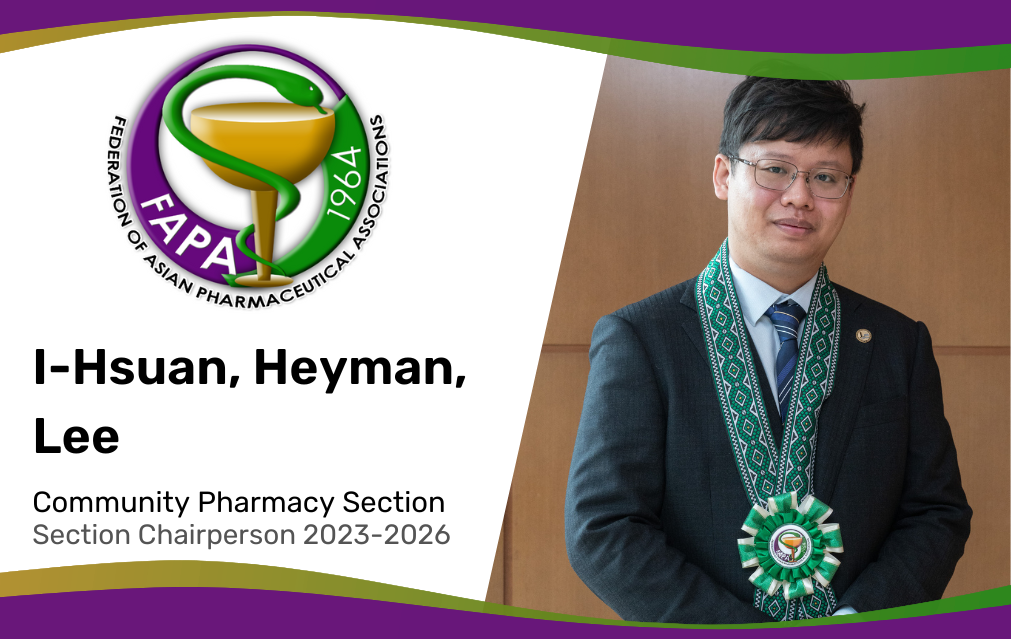
Community Pharmacy Section Chairperson
Mr. I-Hsuan(Heyman) Lee
Member Association: Pharmaceutical Society of Taiwan
Country: Taiwan
Mr. I-Hsuan, Heyman, Lee has been active in public affairs since his student days. He actively participated in the GPP Training in the first beginning in Taiwan. After joining the Taiwan Young Pharmacists Group, he devoted himself to promoting the GPP Training Program to pharmacists across Asia. He was the president of the TYPG from 2019 to 2021, and actively advocated the establishment of young pharmacists’ organizations in Asian countries. Currently, he is the executive supervisor of the Federation of Taiwan Pharmacists Associations, the representative of the Medical Service Reimbursement Scheme Joint Committee of National Health Insurance Administration, an expert of OTC Advisory Group of TFDA. He has nearly 10 years of experience in community pharmacy, and currently runs the Izumo Pharmacy to provide pharmaceutical care services. During the pandemic, he provided more than 1,400 patients with Paxlovid MTM services. He also continues to promote public health initiatives, such as promoting AIDS-friendly pharmacy, betel nut control, pharmacist participation in vaccination, and homecare pharmacy. And lead many government innovation policies, such as electronic prescription, telepharmacy, veterinary medicine compounding and so on. In 2023 FAPA Congress in Taiwan, he will lead the reception team to bring the warmest welcome to the participants.
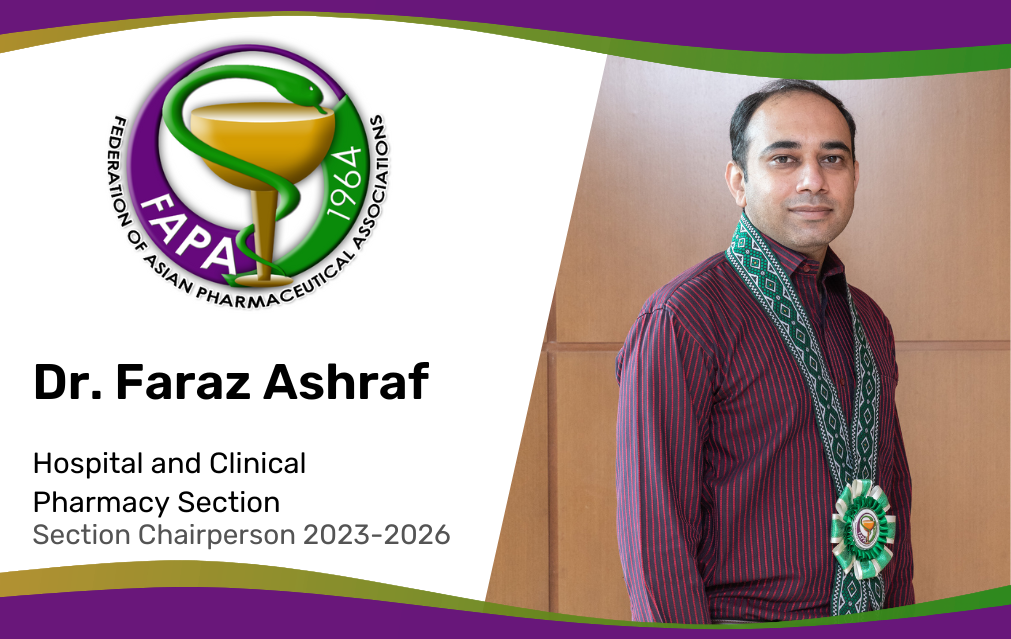
Hospital and Clinical Pharmacy Section Chairperson
Dr. Faraz Ashraf
Member Association: Pakistan Pharmacists Association
Country: Pakistan
Dr Faraz Ashraf was awarded with the degree of Doctor of Pharmacy in 2008 from a renowned University of Pakistan. He started his carrier immediately and was selected by the Health Department, Government of Punjab through Public Service Commission and was posted as Hospital/Clinical Pharmacist in the University of Child Health Sciences & The Children’s Hospital, Lahore which is the Asia’s largest paediatric hospital with 1100 bed strength.
He did his Master of Philosophy in Pharmacy in 2015 and started my Ph.D in Pharmacy in 2020 for which a multi-centre research is still on going.
He was promoted in the Department of Health as Deputy Director Pharmacy/Deputy Drugs Controller and his next promotion is due again as Drugs Controller in the Province of Punjab, Pakistan.
He also attended multiple FAPA congresses including the congress in Thailand and Philippine. He also presented his research work in the said conferences which was very well appreciated. He have good knowledge and grip on the Clinical and Hospital Pharmacy and currently supervising the Pharmacy Department of the University of Child Health Sciences & The Children’s Hospital, Lahore.
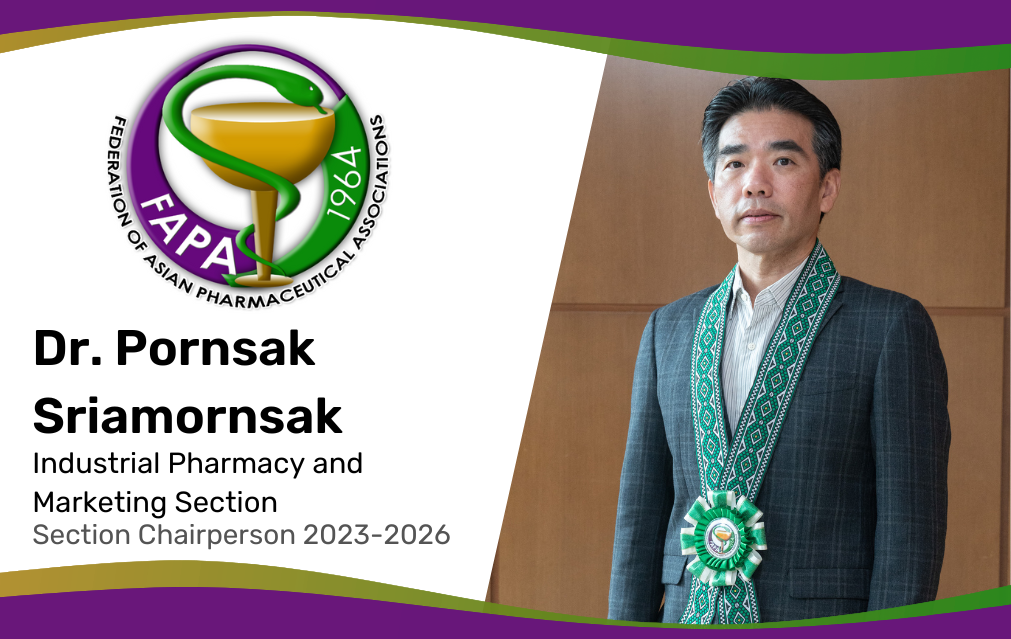
Industrial Pharmacy and Marketing Section Chairperson
Prof. Dr. Pornsak Sriamornsak
Member Association: Pharmaceutical Association of Thailand under Royal Patronage
Country: Thailand
Dr. Sriamornsak is a Professor at Faculty of Pharmacy, Silpakorn University. He is also a member of Pharmaceutical Association of Thailand under Royal Patronage (PAT); Vice President of Thai Industrial Pharmacist Association (TIPA); Fellow and Secretariat of the College of Industrial Pharmacy of Thailand (CIPT). He serves as an editorial board member of several journals (including TIPA Journal). He has contributed to the PAT and FAPA in many occasions (since 1994). He was also the scientific committee chairman of the 26th FAPA Congress, which held in Bangkok during 9-13 November 2016. He is actively involved in organizing training and knowledge development activities for industrial pharmacists organized by TIPA and CIPT.
He received many research awards, e.g., Nagai Award Thailand for Research (2002), Thailand Young Scientist Award (2004), TRF-CHE-Scopus Researcher Award in Health Sciences (2009), FAPA Ishidate Award for Pharmaceutical Research (2012), Thailand Distinguished Polymer Scientist (2013), National Distinguished Researcher Award (2013), Outstanding Pharmacist Award in Research and Development (2015) from PAT, Outstanding Contribution Award from Asian Journal of Pharmaceutical Sciences (2018), etc. Recently, he is included in the World’s Top 2% of the Most-cited Scientists 2020 and 2021, in pharmacology and pharmacy, as ranked by Stanford University.
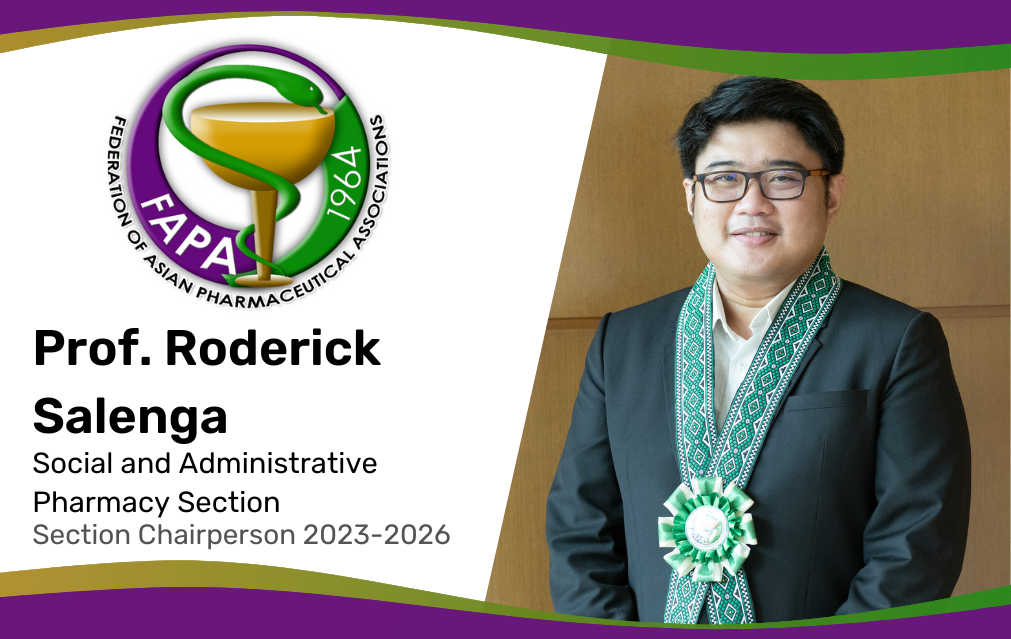
Social and Administrative Pharmacy Section Chairperson
Prof. Roderick L. Salenga
Member Association: Philippine Pharmacists Association, Inc.
Country: Philippines
Roderick Salenga has over 18 years of combined professional experience in academe, pharmacy practice, public health and social development. His competence, professionalism and body of work align with the mission and values of FAPA, as he brings forward critical and unique skills set and expertise of pharmacists in health systems development/strengthening work. He has been actively participating in FAPA activities since 2011 in various capacities (e.g., resource person, workshop facilitator, plenary speaker, etc.). In 2018, he was Program Committee Chair for the 27th FAPA Congress held in the Philippines.
As an international civil servant, he has worked with Health Ministries, development partners, patient groups, professional societies, and policymakers in advancing agenda of Access to Medicines and Universal Health Coverage. His portfolio includes tangible work in national medicines policy, antimicrobial stewardship, essential medicines list, regulatory systems strengthening, pharmacovigilance, medicines quality surveillance, supply chain management, pharmacy workforce development, and good governance in medicines. As an academic, he introduced breakthrough education models around experiential learning, community-based education, and interprofessional education/collaboration. He served as lead convenor for the development of Philippine Practice Standards for Pharmacists. He co-founded the Young Pharmacists Group – Philippines and the Asian Young Pharmacist Group. In 2018, he was the recipient of the FAPA Ishidate Award (Pharmacy Education).
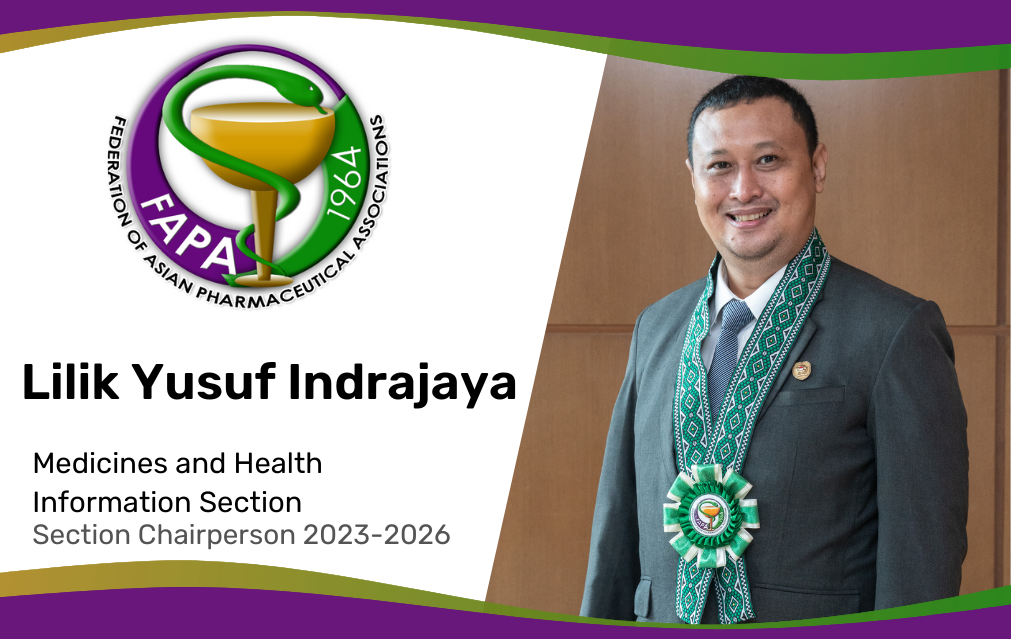
Medicines and Health Information Section Chairperson
Mr. LilikYusuf Indrajaya
Member Association: Indonesian Pharmacists Association
Country: Indonesia
Mr. Lilik Yusuf Indrajaya currently serves as Secretary General of the Indonesian Pharmacists Association (IAI). He contributes his valuable time and expertise to the organization. Throughout his career, he has been inspired by courage, energy, and knowledge. He has served in multiple leadership roles in the context of the IAI program on national’s health care needs and expectations, especially in the community pharmacy. The candidate Won GPP FAPA travel grand scholarship 2013, active in community Pharmacy and hospital
